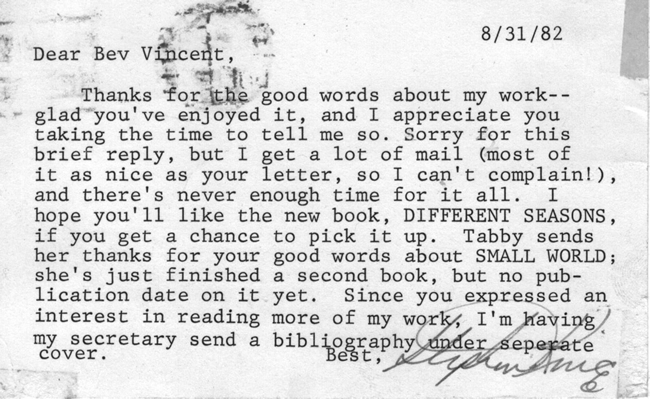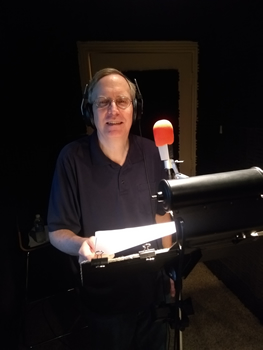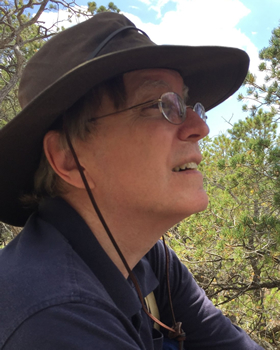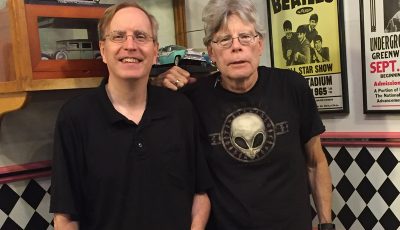

Between the Lines: Bev Vincent, Interview by Stephen King
Exploring Stephen King’s Vast Sphere of Influence
 Interview by Stephen King
Interview by Stephen King
Intro by Dawn Ius
On any given week, there’s a good chance #StephenKing will be trending on Twitter.
Sometimes, it’s King himself sharing his take on current events, promoting a new book or adaptation of his work, or giving a shout-out to an author peer. But just as often, #StephenKing is trending because someone has discovered his work for the first time, or, likely, been inspired and influenced by it.
Though known as the master of the horror genre—with more than 60 brilliant novels to back up the claim—King’s sphere of influence stretches beyond the literary realm. Perhaps no one understands that more than Bev Vincent, a self-proclaimed King “know it all” and the author of the latest book on the King of Horror himself, THE STEPHEN KING ULTIMATE COMPANION: A COMPLETE EXPLORATION OF HIS WORK, LIFE, AND INFLUENCES.
In it, Vincent takes a deep dive into King’s body of work over his staggering, nearly 50-year career to peel back the layers of how his writing reflects the changing times and the events within his life. No matter what you think you know about King, Vincent tells us more.
This impressive—and incredibly well-written—compendium includes archival photos and documents from King’s personal collection, along with the stories about how each of his works came to be. And the release—September 13—comes just in time to celebrate King’s 75th birthday.
As one of the world’s foremost authorities on King’s work, Vincent has often been interviewed about Stephen King. We decided to shake things up a bit: In this exclusive The Big Thrill first, Vincent is interviewed by King. Please join us in welcoming Bev Vincent and Stephen King to this month’s Between the Lines spotlight.
Stephen King: What was your first encounter with my writing?
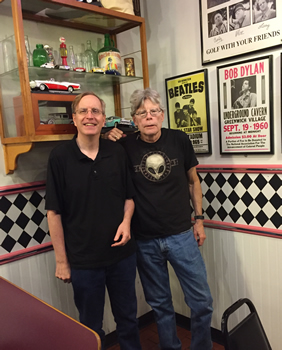
Bev Vincent and Stephen King at Nicky’s Cruisin’ Diner in Bangor, Maine, shortly after King pitched the idea for their 2018 horror anthology Flight or Fright. Photo credit: Dorothy Chan
Bev Vincent: In 1979, during my first year at university, I discovered a used bookstore called Back Pages about a mile from campus that became my favorite haunt on Saturday mornings. It was in a Victorian house with narrow corridors and all these little, interconnected rooms filled with books. At the time, I was reading mostly science fiction and fantasy, people like Heinlein and Asimov. It was a rare day that I didn’t leave with five or six books.
One Saturday, I noticed an intriguing book on an endcap near the checkout. The cover was all black except for a single drop of blood at the corner of the mouth of an embossed face. When I saw the title, I remembered a friend had mentioned enjoying it, so I added it to my weekly stack. The impulse purchase of ‘Salem’s Lot was my first encounter with your writing, and I was immediately hooked.
I’ve always been a completist when I discover something I like. I didn’t just read the Hardy Boys, I read every one of those books, and when I transitioned to Agatha Christie, I carried a checklist so I could track down the titles I was missing. I enjoyed ‘Salem’s Lot so much I immediately had to read everything else you’d written. In 1979, that was easily done, as there were only a handful of previous works, but what an experience it was reading Carrie, The Shining, The Stand, and Night Shift over the next several weeks.
Then it became a matter of waiting for the next one to come out. As a poor undergrad, I could only stare longingly at the hardcover edition of The Dead Zone, but within a couple of years, I bit the bullet and started buying hardcovers. No more waiting for the paperback.
I wrote my first-ever fan letter to an author in 1982, and you were gracious enough to respond. You also sent a two-page, double-sided bibliography that listed where to find uncollected short stories, interviews, and essays. That became my checklist for quite some time.
SK: What has interested you about it enough for you to write about it as often (and as well) as you have?
BV: I was captivated by your skills as a storyteller but, even more than that, by the way you created such compelling, memorable characters that bring the stories to life. I’ve often said that if you started writing romance novels, I’d read them because I know I’d enjoy the characters. There are other writers I read regularly, but when I see the title of earlier works, although I remember what the story was about, the characters don’t emerge as vividly in my mind as they do with your books. I feel like I know hundreds of characters who have populated your books and stories.
When computer networks became popular in the early 1990s, there was something called FidoNet. You had to dial into a computer that was connected to other computers, and it had message boards dedicated to various topics. I joined one devoted to your work. That morphed into USENET and alt.books.stephen-king. You posted on that newsgroup yourself a couple of times, once at Cornell while on your motorcycle tour in support of Insomnia. It was a very active group with scores of posts every day, something that wasn’t true of many of the other authors I was reading at the time. People felt compelled to discuss your work in great detail. They asked questions like “What was the name of that guy in that book who did this or that?” or “What stories mention Castle Rock?” Often, if I didn’t know the answer, I’d look it up, so I gained a reputation as something of a know-it-all.
Marketing people were also monitoring newsgroups to see what they were all about and how they could be used for promotion. Some of them started reaching out to me to supply details about forthcoming works or interviews, so I became a reliable source of information.
Then, in 2001, when our mutual friend Richard Chizmar was revamping Cemetery Dance magazine after a hiatus, he asked if I would write a column for the magazine: news, reviews, and commentary about your work. I was already writing book reviews for the local newspaper at the time. This was an opportunity to do in print what I was already doing on the Internet, so I agreed and have been writing News from the Dead Zone ever since.
After a while, people started asking me when I was going to write a book about your work. That seemed like a daunting prospect. Even in the early 2000s, there were a lot of books to cover. Bill Sheehan had done a terrific in-depth analysis of Peter Straub’s novels in At the Foot of the Story Tree, but the number of books Peter had published at the time was manageable. Something similar about your work seemed like a doctoral thesis’s worth of work—and I’d already done one of those! However, when I heard you were finishing the Dark Tower series, I thought I could write something meaningful about that series that could also address your larger body of work, which led to The Road to the Dark Tower.
While I’ve never been all that interested in writing biography, I am fascinated by how things that happened in your life provided inspiration for what you wrote subsequently, and I’ve tried to find ways to do that in my own fiction. I’ve learned there’s power in truth-based-fiction that isn’t always there in pure fiction.
In 2008, I was approached by the editor of a book packager called becker&mayer! They’d been commissioned by Barnes & Noble to produce a “reader’s companion” to your work. Based on my previous book, they thought I was a good candidate to write it. I was impressed by the quality of the companions they’d done about Edgar Allan Poe and Jane Austen. In particular, they had pockets containing removable documents. In one pouch in the Poe book, for example, you could remove and unfold a faithful reproduction of the page from the New York Times carrying Poe’s obituary. So I agreed to write what became The Stephen King Illustrated Companion, which featured reproductions of rare documents you gave us permission to include from your literary archives. For that book, because of word-count limitations, I covered only a selection of your books, focusing on ones with an interesting biographical component to their development.
Last year, I asked the publisher (now an imprint of the Quarto group) if they’d be interested in updating that book to include more recent works. Instead, they suggested a new volume, greatly expanded, that touched on every novel. STEPHEN KING: A COMPLETE EXPLORATION OF HIS WORK, LIFE, AND INFLUENCES is over twice as long as the previous version. Sadly, there aren’t any removable documents in this book (paper and production costs made it prohibitive), but it is profusely illustrated, and I enjoyed doing a deeper dive into the books I’d omitted previously, as well as adding sections about your famous fictional towns, Derry and Castle Rock, and coming up with interesting (to me at least!) sidebars and “interludes” about a wide variety of topics.
SK: Do you have a favorite story?
BV: ‘Salem’s Lot is certainly dear to my heart because it is, first and foremost, a terrific novel but also it was my first. I often cite Bag of Bones as a favorite novel—the first-person narrative is immersive, and it seems like an intensely personal book. Your recording of the audiobook makes it feel like you’re telling us a story around a campfire. And then Lisey’s Story makes the perfect companion piece. They’re like bookends: one is about the writer who lost his wife, and the other is about the wife who lost her writer-husband.
For shorter works, I’d say “Umney’s Last Case” stands out. I’m a big fan of noir and crime fiction, and this one gives those genres a unique twist. People don’t always realize how much crime fiction you’ve written, all the way back to some of your earliest short stories. Things like “The Wedding Gig,” “The Fifth Quarter,” and “Quitters, Inc.,” which are all straight crime.
SK: Have you read any studies of my work that you found useful?
BV: I have quite a stack of books about your work that I use as reference material, but the first remains the best: The Art of Darkness by Douglas E. Winter. It was published in 1984 and updated in 1986 to include the early Bachman books, so it is dated, but he interviewed you at length about your existing work, and I often refer to it. I also enjoyed Stephen King: Man and Artist by your college professor Carrol F. Terrell, especially the section where he discusses giving you feedback on The Long Walk and the unpublished novel Sword in the Darkness.
Other than that, I prefer primary sources. There are a couple of Underwood/Miller books that collect interviews from early in your career and, thanks to the Internet, it’s possible to find many subsequent interviews. Since my main interest is in how biography impacts fiction, my preference is to seek out your own words, especially from the era when the books were written. As you’ll see from the endnotes in the new book, I illuminated my text with quotes from your interviews, afterwords, and introductions. Rarely do I rely on things other people have said.
That said, I’ve also enjoyed the books written by the late Rocky Wood, especially those that cover your unpublished work. He spent a lot of time in your archives, summarizing the plots of stories and novel fragments that no one can see otherwise.
SK: Name your five or six favorite writers (not me).
BV: It’s hard to limit it to just a handful! I cut my teeth on Lawrence Block, Ray Bradbury, Ed McBain, Raymond Chandler, Robert B. Parker, and Dashiell Hammett. Writers on my automatic purchase list these days include Ian Rankin, Michael Connelly, Haruki Murakami, Michael Koryta, Ian McEwan, and Kate Atkinson. Recent additions to this list include Sarah Pinborough, Linwood Barclay, Stephen Graham Jones, and Sarah Langan.
I also have a second group of favorites: books I read to my wife. We have a longstanding tradition where I read to her every evening. These tend to be gentler novels. We’re currently on the third book of Martha Grimes’ Emma Graham series, but other regulars include Alexander McCall Smith’s No. 1 Ladies’ Detective Agency books, Craig Johnson’s Longmire series, Fannie Flagg, and James Herriot.
SK: How has your reading—including my stuff—influenced your own fiction?
BV: When I was an undergrad in the early 1980s, I started writing short stories. I’d written a couple in junior high that were strongly influenced by Agatha Christie, but in the eighties, I was under the influence of Night Shift. Although I never submitted any of them for publication at the time, I read them aloud to my friends in dorm. I still have all the original typescripts and have revamped and published several in recent years. They were pure horror and very much in the vein of early Stephen King.
I started writing fiction again in 1999, mostly horror stories. However, I found myself more comfortable writing capers, mysteries, and private investigator stories. Most of what I read is crime fiction, and I’ve been moving in that direction with my fiction, too. Even my occasional science fiction or horror stories typically have a crime aspect to them. The Maltese Falcon set aboard a space station, for example.
Donald Westlake-style capers are a favorite genre. I have several humorous stories featuring a gang of inept criminals whose robberies never go according to plan that owe something to him. Another series is about a private detective named Benjamin Kane, a former cop who lives and works in Houston, not far from where I live. He has appeared in about ten of my stories, and I also have a novel I hope to see published someday. While a lot of PI novels feature lone-wolf detectives who can’t maintain relationships, I decided to flip that script and create a man who works with his brother and has close friends and stable(ish) romances.
But I haven’t abandoned horror altogether. I have another novel (inspired in part by your early career) that I’m really excited about, which I hope will find a publisher. And I also recently published a novella called “The Dead of Winter” that was my horror homage to the Hardy Boys (with a little Hunter S. Thompson thrown in for good measure), so everything I’ve ever read comes into play eventually.
- ITW Presents: The Breakout Series - April 25, 2024
- The Big Thrill Recommends: THE GARDEN GIRLS by Jessica R. Patch - April 25, 2024
- The Big Thrill Recommends: AN INCONVENIENT WIFE by Karen E. Olson - April 25, 2024

